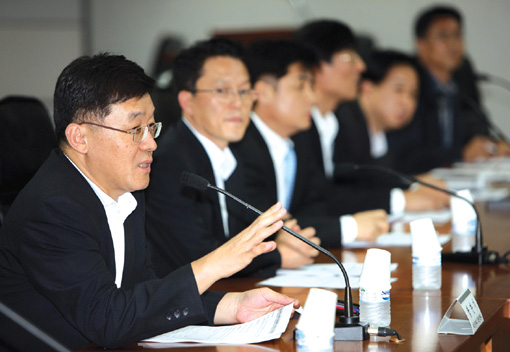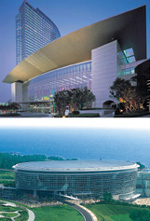Cultivating Convention Industry

A joint government-private sector task force on the development of the convention industry held a seminar and discussed ways of promoting the industry from the mid- and long-term perspectives.
Prof. Hwang Hee-gon of Hallym University Graduate School of International Studies disclosed four policy tasks on nurturing the Korean convention industry to serve as a magnet for foreign buyers in a keynote speech at the seminar held at the Korea International Trade Association Conference Room on Sept. 4. First, Hwang said, Korea needs to foster the top three global exhibitions or Asia¡¯s top-rated ones in order to make exhibitions bigger and on an international scale, encourage business circles to integrate exhibitions displaying similar exhibits, and crank up efforts to attract and manage foreign buyers.
Second, he said, the government is seeking to expand the infrastructure of KINTEX and other exhibition venues and their neighborhood areas, build statistics and standardization infrastructure so that reliable data can be attained, set up an information system covering exhibitions and exhibition venues, and provide support for the establishment of joint exhibition logistics centers.

Third, Hwang said, the nation wants to designate and develop the neighborhood areas of provincial exhibition venues as special zones in order to nurture the regional convention and exhibition industry and consider them in connection with the Greater Economic Sphere Development Plan (5+2).
Fourth, he said, the government is considering providing direct support to exhibitors participating in exhibitions and reducing local taxes and other surcharges being charged with exhibition centers in order to overhaul systems related to the convention industry.
Recognizing the need to make the most of exhibitions as tools for overseas marketing and the significance of the convention industry as a national strategic one, major nations are rushing to provide tax breaks to exhibitions centers and provide support for the construction of exhibition venues.
In the United States, 91 percent of American companies gain information on purchases through exhibitions, while 60 percent to 70 percent of total trades in Germany are made through exhibitions.
Subsidies are allowed for the development of the convention industry under the World Trade Organization (WTO) regime, so the corporate use of the industry as a marketing tool is becoming increasingly important.
Director General for Trade Chung Man-ki said his ministry will consult with related ministries to reflect views and suggestions made by the seminar into a mid- and long-term master plan on trade infrastructure to be established in October. nw
Director General for Trade Chung Man-ki speaks about ways to nurture the convention industry at a seminar at the KITA conference room on Sept. 4.
(counterclockwise) Coex, KINTEX and Jeju ICC convention centers.
3Fl, 292-47, Shindang 6-dong, Chung-gu, Seoul, Korea 100-456
Tel : 82-2-2235-6114 / Fax : 82-2-2235-0799